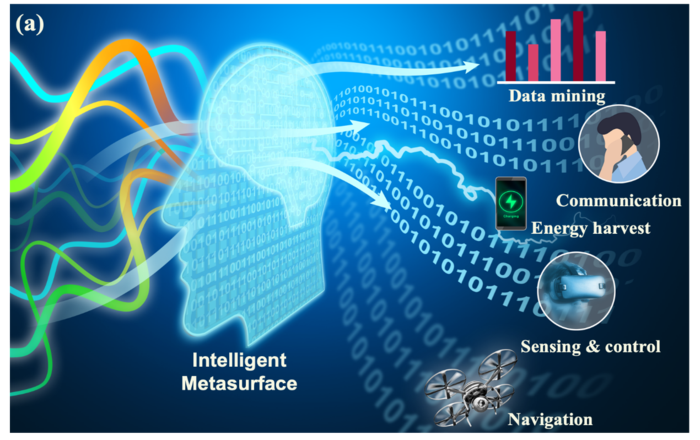Reviewed by Alex SmithMay 9 2022
In our everyday lives, the manipulation of electromagnetic waves and information has become vital. Intelligent metasurfaces have emerged as smart platforms for regulating the wave–information–matter interactions in the absence of manual intervention.
 The intelligent metasurface, AI-empowered artificial material, is a smart platform enabling various functions such as data mining, communication, energy harvest, and sensing by directly processing illuminated information-carrying waves on the physical level. Image Credit: Lianlin Li, Hanting Zhao, Che Liu, Long Li, and Tie Jun Cui
The intelligent metasurface, AI-empowered artificial material, is a smart platform enabling various functions such as data mining, communication, energy harvest, and sensing by directly processing illuminated information-carrying waves on the physical level. Image Credit: Lianlin Li, Hanting Zhao, Che Liu, Long Li, and Tie Jun Cui
They have evolved from engineered composite materials, such as metasurfaces and metamaterials. As a society, one has noticed considerable progress in metamaterials and metasurfaces with various forms and characteristics.
Professor Tie Jun Cui of Southeast University and Professor Lianlin Li of Peking University headed a research team to examine intelligent metasurfaces. “Intelligent metasurfaces: Control, Communication and Computing” analyzed the development of intelligent metasurfaces with an eye for the future. The study was published in the journal eLight.
This field has helped revive human insights into several basic laws. The researchers have disclosed numerous novel devices and systems, like tunneling, cloaking and holograms. Traditional structure-alone or passive metasurfaces have shifted towards intelligent metasurfaces by combining algorithms and nonlinear materials (or active devices).
Intelligent metasurfaces consist of three vital properties: programmability, digitalization and intelligence. They offer a significant chance to regulate the interactions without human intervention.
Digitalization allows the metasurface to encode, decode and also store digital information. Programmability implies that the metasurface has the ability to identify diverse functions with just one physical entity. Intelligence denotes that the intelligent metasurface can make decisions, self-program, and execute successive tasks in the absence of human supervision.
Intelligence is known to be the core, and algorithms can play this role well. Artificial intelligence (AI) has shown rapid emergence, especially in the field of knowledge discovery and data mining. Deep learning has proven remarkably beneficial in almost every field of science and engineering.
Deep learning has considerably and positively affected the metamaterials and metasurfaces field. It will unarguably give rise to extensive and active research directions.
When evaluating the future of intelligent metasurfaces, the wireless signals that earlier existed in lives could be crucial to additional development. The growth of 6G wireless communications, green IoT and digital twinning is where intelligent metasurfaces could gain the advantage.
One can visualize that intelligent metasurfaces have the potential to learn, make decisions, self-programming and constantly learn throughout their “lifetime.” The intelligent metasurface is an advancing research direction consisting of numerous disciplines. There are a lot of open questions required to be fulfilled carefully in the days to come.
Journal Reference:
Li, L., et al. (2022) Intelligent metasurfaces: control, communication and computing. eLight. doi.org/10.1186/s43593-022-00013-3